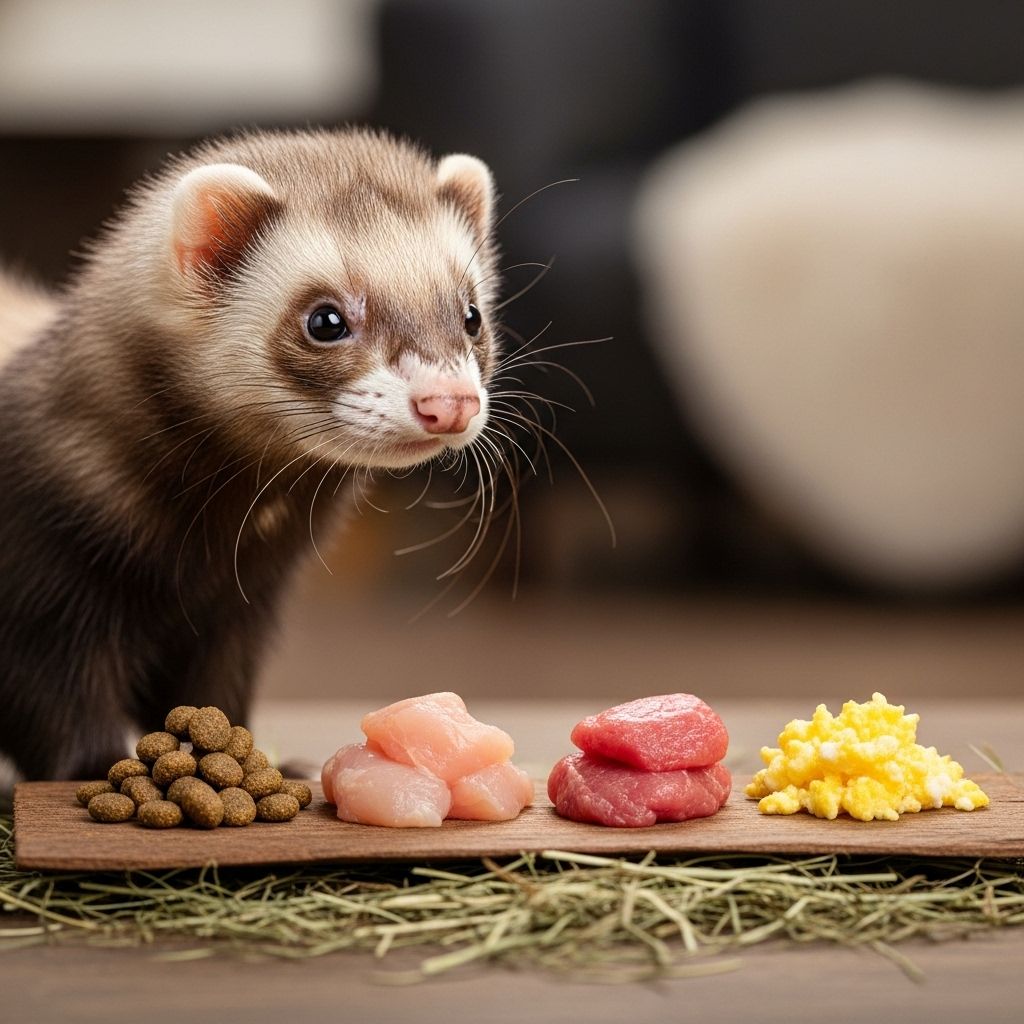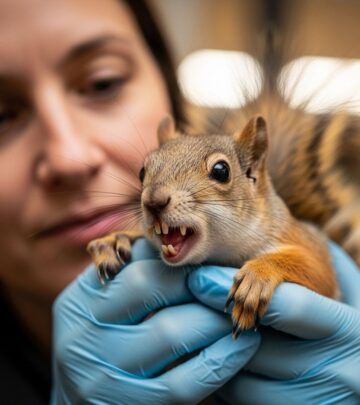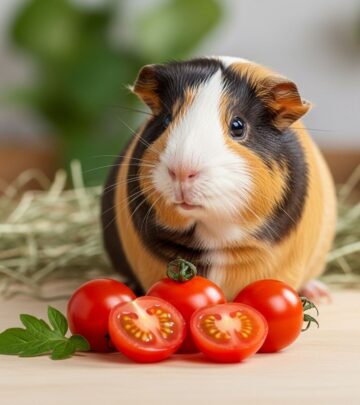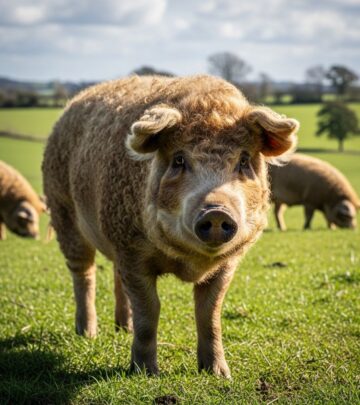What Do Ferrets Eat? Complete Guide to a Healthy Ferret Diet
A balanced animal-based diet keeps small carnivores energized and thriving.

What Do Ferrets Eat? A Comprehensive Guide to Ferret Nutrition
Ferrets have become increasingly popular as companion animals, and just like cats and dogs, they deserve a nutritious, appropriate diet. But what exactly do ferrets eat? Are there foods that are dangerous for them? If you’re welcoming a ferret into your home, understanding their dietary needs is crucial for their long-term health and happiness.
Are Ferrets Obligate Carnivores?
Yes, ferrets are obligate carnivores. This means their bodies are adapted to eat animal protein and fat, with little ability to digest carbohydrates, fiber, or plant-based proteins. A ferret’s digestive tract is short and their metabolism is very fast, so they must consume easily digestible, high-quality animal proteins and fats to thrive.
Ferrets require:
- High animal protein: At least 32–40% of their diet.
- High fat content: Ideally 15–20% (with a protein to fat ratio of about 2:1).
- Very low fiber and carbohydrates: Less than 4% fiber; plants and grains are not well-digested and can cause serious health issues.
Ferret Diet Basics: What a Healthy Ferret Should Eat
Ferret nutrition should always start with these guiding principles:
- Feed high-protein foods: The majority of their diet should come from animal sources—look for commercial foods with animal protein as the first ingredients.
- Focus on animal fats for energy: Fat provides essential energy and is preferable to carbohydrates for ferrets.
- Offer small, frequent meals: Due to their fast metabolism, ferrets need to eat 8–10 small meals a day or have constant access to food.
- Fresh water is essential: Clean, fresh water should always be available.
- Consult your veterinarian: Life stage, health status, and preferences can influence your ferret’s dietary needs.
Commercial Ferret Foods: How to Choose a Balanced Diet
The easiest and safest way to meet all your ferret’s nutritional needs is to feed a high-quality, commercially prepared ferret food that is specifically formulated for their species. These diets are designed to be complete and balanced, containing the right mix of protein, fats, vitamins, and minerals.
When choosing a commercial ferret food, check the label for:
- Animal protein: Should make up at least 30–40% of the diet. Meat, poultry, or fish sources should be the first ingredients.
- Fat content: Should be 15–20% for most healthy adults.
- Very low carbohydrates: Avoid foods filled with plant protein (e.g., soy), grains, or fiber.
- No artificial additives: The best ferret foods contain minimal artificial colors or flavors and avoid cheap fillers.
Brands that provide nutritionally complete ferret food include Mazuri, Marshall, Zupreem, and Wysong. Always confirm the food has been approved for ferrets and check expiration dates for freshness.
Can Ferrets Eat Cat or Dog Food?
Dog food is never suitable for ferrets and should be strictly avoided. While some high-protein, grain-free kitten foods have historically been recommended as backup options, it’s always better to choose a diet that is specifically formulated for ferrets when possible. Cat food, particularly that made for adult cats or with too much plant protein, can cause health problems if fed long-term.
Raw Feeding and Whole Prey Diets
Some ferret owners prefer to provide their pets with a diet that mimics what ferrets might eat in the wild—whole prey or balanced raw diets. This can include:
- Thawed whole rodents (e.g., mice, rats)
- Day-old chicks
- Quail, rabbits, or small birds (sourced frozen from reputable suppliers)
- Balanced raw mixes that include muscle meat, bone, and organs (in the correct ratios)
If you choose to feed raw or whole prey, be aware:
- It must be properly balanced to prevent nutritional deficiencies (simple “meat only” diets lack key nutrients).
- There is a risk of bacterial contamination; practice strict hygiene.
- Feeding live animals is typically illegal and inhumane—always use humanely sourced, frozen-thawed prey.
- Variety and rotation are key for complete nutrition.
Safe Fresh Foods and Treats for Ferrets
While the bulk of your ferret’s calories should come from high-quality commercial foods or balanced raw diets, you can occasionally offer safe animal-based treats such as:
- Cooked eggs (hard-boiled, scrambled with no added butter or seasoning)
- Small pieces of plain cooked chicken or turkey
- Freeze-dried meat treats (made specifically for ferrets)
- Bits of organ meats (liver, heart, kidney) in moderation
Treats should always be less than 10% of their total daily intake. Avoid sugary, salty, fatty, or highly processed human foods. When offering new foods, introduce slowly and watch for signs of stomach upset.
Foods That Are Dangerous or Unhealthy for Ferrets
Certain foods are toxic or unsafe for ferrets and must always be avoided. These include:
- Fruits: Grapes, raisins, citrus, apples, bananas, and other fruit can cause stomach upset, diarrhea, or more serious health problems.
- Vegetables and plant material: Ferrets can’t digest plants, and some can cause blockages or toxicity. Never feed onions, garlic, potatoes, peas, or corn.
- Sugar and carbohydrates: Candy, honey, cookies, bread, and chips can cause obesity and illness.
- Dairy products: Most ferrets are lactose intolerant; cheese and milk can cause diarrhea.
- Dog food: Lacks necessary nutrition and may even be dangerous.
- Processed human foods: Fast food, junk food, and salty snacks are all harmful for ferrets.
- Chocolate, caffeine, and alcohol: All highly toxic to ferrets.
How Much and How Often Should You Feed a Ferret?
Unlike dogs and cats, ferrets should have access to food at all times because:
- They metabolize their food rapidly (digestion takes about 3 hours).
- Frequent small meals or free feeding helps prevent blood sugar crashes.
- Most healthy adult ferrets require about 200–300 kilocalories per kilogram of body weight per day.
Growing kits, pregnant or lactating females need up to triple this amount. Monitor your ferret’s body condition and consult with your vet to tailor the feeding regimen to your pet’s needs.
Water: A Vital Daily Need
As with any companion animal, fresh, cool water must always be available. Ferrets quickly dehydrate if water is withheld. Offer water via:
- Heavy ceramic bowls (harder to tip over)
- Water bottles (which must be checked and cleaned regularly)
Change water daily and clean bowls frequently to prevent bacteria build-up.
Ferret Diets for Different Life Stages
Your ferret’s dietary needs can shift throughout their life:
- Kits (baby ferrets): Need diets extremely rich in protein and fat for growth. Kibble may be moistened to ease eating.
- Pregnant/lactating jills: Their calorie needs can triple. Feed a diet with extra protein and fat and let them eat ad libitum.
- Senior ferrets: May need special formulations for age-related health changes. Watch for dental problems or weight loss.
- Sick or recovering ferrets: Special diets may be required; always consult your veterinarian in these cases.
Practical Feeding Tips for Ferret Owners
- Feed a combination of dry, wet, and freeze-dried foods for variety and dental health.
- Store foods correctly to preserve freshness and avoid spoilage.
- Transition to new diets gradually over 7–10 days to avoid stomach upset.
- Weigh your ferret regularly and check their body condition.
- If changing brands or food types, observe for picky eating or GI upset.
- Clean food and water bowls every day.
- Consult your vet before making major dietary changes.
Table: Ferret Food Options Compared
| Food Type | Pros | Cons |
|---|---|---|
| Commercial Ferret Kibble | Convenient, nutritionally complete, long shelf life | Some brands may contain fillers; less variety/mental stimulation |
| Balanced Raw Diet | Closer to natural diet, high palatability, good dental health | Can be time-consuming, risk of bacterial contamination, requires careful balancing |
| Whole Prey (frozen-thawed) | Ideal natural food, provides mental enrichment, stimulates natural behaviors | May be unappealing to some owners, sourcing can be difficult, higher cost |
| High-Protein Kitten Food | Useful in emergencies, readily available | Not complete for ferrets long-term, some brands too high in carbs |
Frequently Asked Questions About Feeding Ferrets
Q: Can ferrets eat fruits or vegetables?
A: No. Ferrets cannot digest plant material effectively. Fruits and vegetables can upset their stomach or cause dangerous blockages. Focus on animal proteins and fats only.
Q: Is it safe to give my ferret dairy products?
A: No. Most ferrets are lactose intolerant. Dairy may cause diarrhea and stomach problems. Stick to water and animal proteins for treats.
Q: How many times a day should my ferret eat?
A: Ferrets should have access to food all day long or eat at least 8–10 small meals. Their metabolism requires frequent eating.
Q: Can I feed my ferret only meat?
A: Feeding muscle meat alone will cause deficiencies. Ferrets need a balanced diet including organ meats, bones, and supplements. Use balanced commercial or raw diets for complete nutrition.
Q: What human foods should I never give my ferret?
A: Avoid chocolate, onion, garlic, caffeine, alcohol, sugary snacks, salty foods, processed foods, and anything with plant-based proteins or grains.
Summary: A Healthy Diet Keeps Ferrets Thriving
Understanding what your ferret should and shouldn’t eat is a foundation for your pet’s long and healthy life. Feed high-quality animal protein and fat, avoid plant-based foods and dangerous treats, and keep fresh water available at all times. For detailed recommendations or if you have questions about your ferret’s specific needs, always consult with a veterinarian experienced in exotic or small animals.
References
- https://kb.rspca.org.au/knowledge-base/what-should-i-feed-my-ferrets/
- https://mazuri.com/blogs/education-and-nutrition/what-should-i-feed-my-ferret
- https://www.unusualpetvets.com.au/wp-content/uploads/2023/12/a-guide-to-feeding-your-ferret.pdf
- https://vcahospitals.com/know-your-pet/feeding-ferrets
- https://www.merckvetmanual.com/multimedia/table/feeding-a-sick-ferret
- https://www.in.gov/boah/files/Ferrets-General-Care-Guidelines.pdf
- https://www.petmd.com/ferret/what-do-ferrets-eat
- https://www.ukpetfood.org/pet-care-advice/advice-for-small-mammals/ferret-care-nutrition.html
Read full bio of Sneha Tete












